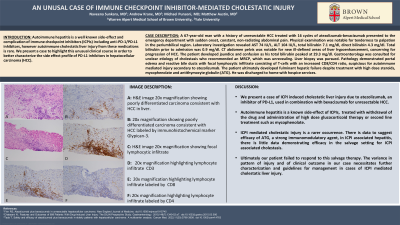Tuesday Poster Session
Category: Liver
P3953 - An Unusual Case of Immune Checkpoint Inhibitor-Mediated Cholestatic Injury
Tuesday, October 24, 2023
10:30 AM - 4:00 PM PT
Location: Exhibit Hall

Has Audio

Naveena Sunkara, MD
Warren Alpert Medical School, Brown University
Providence, RI
Presenting Author(s)
Naveena Sunkara, MD1, Andrew Krane, MD1, Matthew Austin, MD2, Michael Punsoni, MD1
1Warren Alpert Medical School, Brown University, Providence, RI; 2Yale University, Westerly, RI
Introduction: Autoimmune hepatitis is a well known side-effect and complication of immune checkpoint inhibitors (ICPIs) including anti-PD-1/PD-L1 inhibitors, however autoimmune cholestatic liver injury from these medications is rare. We present a case to highlight this unusual clinical course in order to better characterize the side effect profile of PD-L1 inhibitors in hepatocellular carcinoma (HCC).
Case Description/Methods: A 67-year-old man with a history of unresectable HCC treated with 16 cycles of atezolizumab-bevacizumab presented to the emergency department with sudden onset, constant, non-radiating abdominal pain. Physical examination was notable for tenderness to palpation in the periumbilical region. Laboratory investigation revealed AST 74 IU/L, ALT 104 IU/L, total bilirubin 7.1 mg/dl, direct bilirubin 4.3 mg/dl. Total bilirubin prior to admission was 0.9 mg/dl. CT abdomen pelvis was notable for new ill-defined areas of liver hypoenhancement, concerning for progression of HCC. The patient developed jaundice and confusion as his total bilirubin peaked at 29.3 mg/dl. Gastroenterology was consulted for unclear etiology of cholestasis who recommended an MRCP, which was unrevealing. Liver biopsy was pursued. Pathology demonstrated portal edema and reactive bile ducts with focal lymphocytic infiltrate consisting of T-cells with an increased CD8/CD4 ratio, suspicious for autoimmune mediated injury secondary to atezolizumab. The patient ultimately developed fulminant hepatic failure despite treatment with high dose steroids, mycophenolate and antithymocyte globulin (ATG). He was discharged to home with hospice services.
Discussion: We present a case of ICPI induced cholestatic liver injury due to atezolizumab, an inhibitor of PD-L1, used in combination with bevacizumab for unresectable HCC. Autoimmune hepatitis is a known side-effect of ICPIs, often treated with withdrawal of the drug and administration of high dose glucocorticoid therapy or second line treatment such as mycophenolate. ICPI mediated cholestatic injury is a rarer occurrence. While there is data to suggest efficacy of ATG, a strong immunomodulatory agent, in ICPI associated hepatitis, there is little data demonstrating efficacy in the salvage setting for ICPI associated cholestasis. Ultimately our patient failed to respond to this salvage therapy. The variance in pattern of injury and of clinical outcome in our case necessitates further characterization and guidelines for management in cases of ICPI mediated cholestatic liver injury.

Disclosures:
Naveena Sunkara, MD1, Andrew Krane, MD1, Matthew Austin, MD2, Michael Punsoni, MD1. P3953 - An Unusual Case of Immune Checkpoint Inhibitor-Mediated Cholestatic Injury, ACG 2023 Annual Scientific Meeting Abstracts. Vancouver, BC, Canada: American College of Gastroenterology.
1Warren Alpert Medical School, Brown University, Providence, RI; 2Yale University, Westerly, RI
Introduction: Autoimmune hepatitis is a well known side-effect and complication of immune checkpoint inhibitors (ICPIs) including anti-PD-1/PD-L1 inhibitors, however autoimmune cholestatic liver injury from these medications is rare. We present a case to highlight this unusual clinical course in order to better characterize the side effect profile of PD-L1 inhibitors in hepatocellular carcinoma (HCC).
Case Description/Methods: A 67-year-old man with a history of unresectable HCC treated with 16 cycles of atezolizumab-bevacizumab presented to the emergency department with sudden onset, constant, non-radiating abdominal pain. Physical examination was notable for tenderness to palpation in the periumbilical region. Laboratory investigation revealed AST 74 IU/L, ALT 104 IU/L, total bilirubin 7.1 mg/dl, direct bilirubin 4.3 mg/dl. Total bilirubin prior to admission was 0.9 mg/dl. CT abdomen pelvis was notable for new ill-defined areas of liver hypoenhancement, concerning for progression of HCC. The patient developed jaundice and confusion as his total bilirubin peaked at 29.3 mg/dl. Gastroenterology was consulted for unclear etiology of cholestasis who recommended an MRCP, which was unrevealing. Liver biopsy was pursued. Pathology demonstrated portal edema and reactive bile ducts with focal lymphocytic infiltrate consisting of T-cells with an increased CD8/CD4 ratio, suspicious for autoimmune mediated injury secondary to atezolizumab. The patient ultimately developed fulminant hepatic failure despite treatment with high dose steroids, mycophenolate and antithymocyte globulin (ATG). He was discharged to home with hospice services.
Discussion: We present a case of ICPI induced cholestatic liver injury due to atezolizumab, an inhibitor of PD-L1, used in combination with bevacizumab for unresectable HCC. Autoimmune hepatitis is a known side-effect of ICPIs, often treated with withdrawal of the drug and administration of high dose glucocorticoid therapy or second line treatment such as mycophenolate. ICPI mediated cholestatic injury is a rarer occurrence. While there is data to suggest efficacy of ATG, a strong immunomodulatory agent, in ICPI associated hepatitis, there is little data demonstrating efficacy in the salvage setting for ICPI associated cholestasis. Ultimately our patient failed to respond to this salvage therapy. The variance in pattern of injury and of clinical outcome in our case necessitates further characterization and guidelines for management in cases of ICPI mediated cholestatic liver injury.

Figure: A - H&E image taken at 20x magnification showing poorly differentiated carcinoma consistent with hepatocellular carcinoma in liver.
B - Image taken at 20x magnification showing poorly differentiated carcinoma consistent with hepatocellular carcinoma labeled by immunohistochemical marker Glypican-3.
C - H&E image taken at 20x magnification showing focal lymphocytic infiltrate.
D - Image taken at 20x magnification highlighting lymphocyte infiltrate labeled by T-cell marker CD3 immunostain.
E - Image taken at 20x magnification highlighting lymphocyte infiltrate labeled by immunohistochemical marker CD8.
F - I mage taken at 20x magnification highlighting lymphocyte infiltrate labeled by immunohistochemical marker CD4.
B - Image taken at 20x magnification showing poorly differentiated carcinoma consistent with hepatocellular carcinoma labeled by immunohistochemical marker Glypican-3.
C - H&E image taken at 20x magnification showing focal lymphocytic infiltrate.
D - Image taken at 20x magnification highlighting lymphocyte infiltrate labeled by T-cell marker CD3 immunostain.
E - Image taken at 20x magnification highlighting lymphocyte infiltrate labeled by immunohistochemical marker CD8.
F - I mage taken at 20x magnification highlighting lymphocyte infiltrate labeled by immunohistochemical marker CD4.
Disclosures:
Naveena Sunkara indicated no relevant financial relationships.
Andrew Krane indicated no relevant financial relationships.
Matthew Austin indicated no relevant financial relationships.
Michael Punsoni indicated no relevant financial relationships.
Naveena Sunkara, MD1, Andrew Krane, MD1, Matthew Austin, MD2, Michael Punsoni, MD1. P3953 - An Unusual Case of Immune Checkpoint Inhibitor-Mediated Cholestatic Injury, ACG 2023 Annual Scientific Meeting Abstracts. Vancouver, BC, Canada: American College of Gastroenterology.
